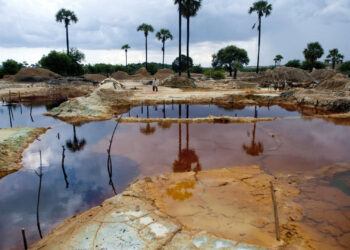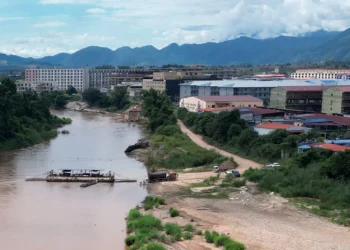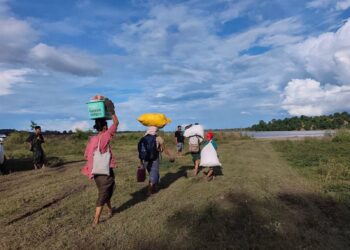The release of Aung San Suu Kyi and around 20,000 fellow political prisoners will be the most crucial step towards ending the conflict in Myanmar, the country’s government-in-exile has said.
The National Unity Government, or NUG, which comprises former lawmakers from various parties and is leading the political opposition to the military junta that seized power in a 2021 coup, has raised concerns about Ms Suu Kyi’s health.
“Aung San Suu Kyi is arbitrarily detained. She is in isolation and it is inhumane for a 79-year-old lady who has sacrificed so much for her country,” Kyaw Zaw, a spokesperson for NUG, said.
He was responding to the documentary, Cancelled: The Rise and Fall of Aung San Suu Kyi, released by Independent TV. The film charts the political journey of Myanmar’s former leader who was thrust into the political spotlight in the 1980s and spent many years in jail for advocating democratic rule in the country.
Mr Zaw said the military junta’s rule has led to an “unprecedented humanitarian crisis” in northern Rakhine State where intense fighting between the army and an ethnic rebel group has reportedly displaced millions of people.
Ms Suu Kyi, who was given the Nobel Peace Prize in 1991, has been held in detention, likely solitary confinement, since the coup overthrew her democratically elected government in February 2021 and plunged the country into crisis.
She was arrested by the military along with top members of her National League for Democracy party, including president Myint Swe, sparking widespread protests, civil disobedience, and armed resistance across the country.
“The Lady”, as she is known in much of Myanmar, was given a sentence of 33 years in prison, later cut to 27 years. The charges against her – ranging from corruption to owning illegally imported walkie talkies – have been widely condemned as politically motivated to discredit Ms Suu Kyi and bolster the military’s claim to power.
Mr Zaw claimed that Ms Suu Kyi’s representatives haven’t been allowed to contact and meet her. “We urge the military leaders to release Aung San Suu Kyi. We also encourage the international community to raise this issue, either publicly or through diplomatic channels, to press the military to release Aung San Suu Kyi and all unfairly detained political prisoners,” he said.
While the international community may have shifted focus to the conflicts in the Middle East and Ukraine, the people of Myanmar remain steadfast in their reverence for Ms Suu Kyi and their commitment to the cause of freedom, Mr Zaw said.
“People in the country still carry out protests and we see her pictures prominently displayed in the cities, keeping the fight for her release alive. Her party, the National League for Democracy, was overwhelmingly supported by the people of Myanmar due to her leadership. She is deeply loved by people from all walks of life in Myanmar,” he said.
This isn’t the first time Ms Su Kyu has faced imprisonment. She was first put under house arrest in 1989 by the then ruling junta. The house arrest would last nearly two decades and make her a symbol of peaceful resistance against oppression.
International campaigns and protests calling for her release led to the end of 21 years of detention in 2010. Five years later, she became the leader of the country after her party won a landslide victory in the national election.
“Maymay is frail and in bad health, which is why I once again make this heartfelt plea for her to be released,” he says. “Her father died bringing freedom to his country. She has sacrificed so much of her life to give people fundamental human rights.”
Mr Aris laments that by her 80th birthday in June next year, Ms Suu Kyi will have spent a quarter of her life in military detention.
Mr Zaw said the NUG government and the people of Myanmar will continue fighting to end the brutal military rule. “The goal is to ensure that there are no more arbitrary arrests or political prisoners. This is the path to freeing not only Aung San Suu Kyi but also the entire nation from the grip of this brutal military dictatorship,” he said.
Fighting resistance forces and rebel groups, the military’s control over the country is weaker than ever in its history, the NUG said. The military first seized power in Myanmar in a 1962 coup.
As many as 90 towns and cities are held by the resistance forces, the government-in-exile said, with the military controlling just 21 per cent of the country in full.
The NUG, set up by lawmakers barred from taking their seats in the parliament by the military takeover, claims to be Myanmar’s legitimate government and has launched attacks on junta facilities.
It recently staged drone attacks on Naypyidaw city, reportedly causing significant damage, as part of a wider strategy to weaken the military.
“Their eventual fall is inevitable,” Mr Zaw said.
A nationwide civil war involving multiple ethnic minority armed forces seeking autonomy has deepened the humanitarian crisis caused by the coup.
Northern Rakhine, the heartland of the Rohingya minority, has seen millions displaced since the Arakan Army, a powerful ethnic armed group seeking autonomy from the central government, launched an offensive in November last year.
The Arakan Army this month reportedly “captured the entire western regional military headquarters based in the Ann township” and took senior military leaders prisoner.
Mr Zaw claimed that as the military loses ground, they increasingly target civilian populations using extreme measures including airstrikes.
“Immediate humanitarian assistance from the international community is urgently needed,” the spokesperson said. “However, it cannot be delivered through traditional channels such as Naypyidaw or Yangon, as the junta uses humanitarian aid as a weapon.”
“Reports and images have shown that the military has weaponized aid, using rice bags meant for vulnerable people as barriers in their warfare.”
Mr Zaw said he hopes “this powerful documentary will wake up the international community” not just about Ms Suu Kyi but also about “the forgotten political prisoners and the people of Myanmar who have been largely overlooked”.
“It also sheds light on the efforts of our National Unity Government, which, alongside the people of Myanmar, is fighting against this brutal military dictatorship,” he said.
“This is the only way to ensure that genocide does not happen again, that the Rohingya people and millions of others can return home with dignity, and that citizenship rights are restored to those who deserve them.”






